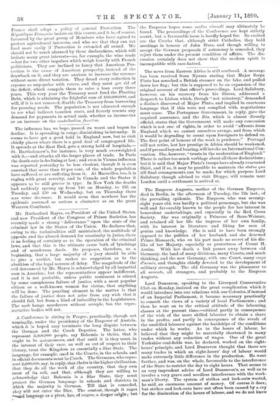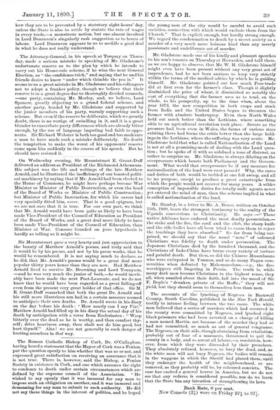Lord Dunraven, speaking to the Liverpool Conservative Club on Monday,
insisted on the great complication which it would introduce into our relations with our Colonies, if instead of an Imperial Parliament, it became necessary practically to consult the views of a variety of local Parliaments ; and then he went on to the critical attitude of the labouring classes at the present time,—critical partly in consequence of the wish of the more skilled labourer to obtain a share in the profits, and partly in consequence of the revolt of the unskilled labourer against the hardships of the conditions under which he works. As to the hours of labour, he believed that they might be materially shortened in many trades without any reduction of wages. One of the great Yorkshire coal-fields was, he declared, worked on the eight- hours' principle, and Lord Dunraven thought that there are many trades in which an eight-hours' day of labour would make extremely little difference in the production. He went further, and was, on the whole, favourable to the interference of the State to restrict the day to eight hours. That seems to us very imprudent advice of Lord Dunraven's, as well as to involve a very grave and needless interference with the work- man's liberty. The system of strikes and lock-outs wasted, he said, an enormous amount of money. Of course it does; but strikes and lock-outs have not often been caused by a cry for the diminution of the hours of labour, and we do not know
how they are to be prevented by a statutory eight-hours' day, unless the State is also to settle by statute the rate of wages in every trade,—a monstrous notion, but one almost involved in Lord Dunraven's singularly rash suggestion as to hours of labour. Lord Dnnraven appears to us to meddle a good deal in what he does not really understand.







































 Previous page
Previous page